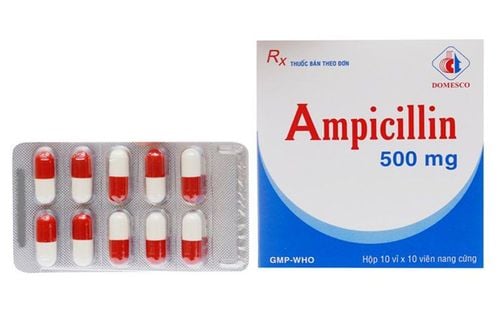This is an automatically translated article.
Antibiotics are important tools to treat diseases caused by bacterial infections such as pneumonia and sepsis. However, antibiotics are not effective against viral infections such as colds or flu. Using antibiotics with a doctor's prescription will help the treatment process have better results, and at the same time do not lead to the risk of antibiotic resistance to ensure that antibiotics are still effective in the future.
1. Antibiotics
Antibiotics are used to treat or prevent certain types of bacterial infections. Antibiotics work by killing bacteria or preventing them from spreading, but they may not work for all diseases. Many mild bacterial infections go away on their own without antibiotics.
Antibiotics are not effective against viral infections such as colds, flu and most coughs or sore throats.
Antibiotics are no longer routinely used to treat:
Chest infections Ear infections in children Sore throat The use of antibiotics should be consulted with a doctor about whether to take them or not. Overuse and indiscriminate use of antibiotics can lead to antibiotic resistance. And that means antibiotics will decrease or no longer work in the future.

Kháng sinh có hiệu quả với bệnh nhanh nhưng không nên lạm dụng nó
2. Antibiotics
There are hundreds of different antibiotics, but most of them can be classified into 6 groups:
Penicillins (such as penicillin and amoxicillin) are widely used to treat a wide variety of infections including skin infections, urinary tract infections and urinary tract infections. Cephalosporins (Cephalexin) are used to treat a variety of infections. However, some are only effective for treating more serious infections such as sepsis and meningitis. Aminoglycosides (such as gentamicin and tobramycin) tend to be used only in hospitals to treat conditions such as blood infections. They can cause serious side effects including hearing loss and kidney damage. They are usually given by injection, but may be used as drops for some patients with ear or eye infections. Tetracyclines (such as Tetracycline and doxycycline) can be used to treat a variety of infections. But, commonly used to treat acne and some skin diseases including rosacea. Macrolides (such as erythromycin and clarithromycin) may be particularly helpful for treating lung and chest infections or as an alternative for people with a penicillin allergy or for treating penicillin-resistant strains of bacteria. Fluoroquinolones (such as ciprofloxacin and levofloxacin) are broad-spectrum antibiotics that have been used to treat a wide range of infections, especially respiratory and urinary tract infections. These antibiotics are no longer used routinely because of the risk of serious side effects.
3. Side effects of antibiotics

Lạm dụng kháng sinh sẽ xảy ra tình trạng kháng kháng sinh
As with any medicine, antibiotics can cause side effects. In cases where antibiotics are used properly, there should be no problems and serious side effects are rare.
Common side effects of antibiotics include:
Feeling sick Feeling tired Symptoms of bloating and indigestion Some serious side effects of taking antibiotics
Severe diarrhea can be fatal Death: Using antibiotics increases the risk of intestinal infections caused by the bacteria Clostridium difficile (commonly called C.diff). When using antibiotics, intestinal bacteria can be destroyed. At this point the diarrhea becomes serious and sometimes fatal (possibly caused by C.diff bacteria). If you are taking antibiotics and have diarrhea, you need to see your doctor for a timely solution. Or even if you have stopped taking antibiotics a few weeks ago and have uncontrollable diarrhea, you should seek help from your doctor and healthcare provider. Antibiotic resistance: The use of antibiotics can increase the risk of bacteria becoming resistant. Antibiotic-resistant infections can be very serious and difficult to treat. Allergic reactions to antibiotics. Some people are allergic to antibiotics, especially penicillins and cephalosporins. While these are extremely rare, when they do, they can lead to serious allergic reactions (anaphylaxis). Antibiotics are a specific type of medicine used in most cases of bacterial infections. Therefore, the use of effective antibiotics should be selected by the doctor. In addition, if oral antibiotics are as effective as parenteral antibiotics, oral antibiotics should be preferred because they are both easy to use and have fewer complications.
Customers can directly go to Vinmec Health system nationwide to visit or contact the hotline here for support.
References source: cdc.gov, clevelandclinic.org, nhs.uk
MORE:
What is antibiotic resistance? Why should antibiotics be enough? What is the mechanism of action of antibiotics?













